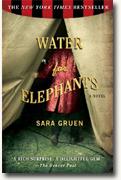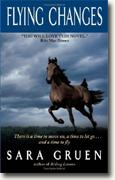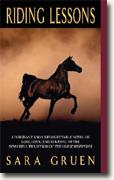![*Water for Elephants* author Sara Gruen [photo credit Terence W. Bailey]](backgrnd/intgruen.gif) An Interview with
An Interview with
Sara Gruen
Interviewer Luan Gaines: I read in the accompanying literature that Water for Elephants was the unintended consequence of research you were doing on another topic. How and why did this particular story come to life?
Sara Gruen: I had completed the research for another novel and was a day away from starting to write when I opened the Sunday paper and found myself staring at a vintage circus photograph. It was an incredible picture—the photographer, Edward J. Kelty, built a camera that was capable of producing negatives that were 12 by 24 inches, so he could take huge crowd shots and capture every detail. I couldn’t tear my eyes from the picture. Finally I poked at it and said “There’s a novel in this!”, in response to which my husband slapped his forehead (we had just returned from a research trip for the other novel).
In the novel, the plot speaks from two points of view: Jacob’s old age and the summer of 1931, when he joined the circus. What forces drove Jacob into his suddenly destitute circumstances?
It was a combination of personal tragedy and the more global horror that was the Great Depression. Jacob’s parents had been hanging on by a thread financially, and when they were killed the bank seized what was left. Jacob had his room and board paid up for the next ten days, but after that he had nothing but the clothes on his back.
Can you speak a little about the desperation of the country in the Great Depression and why even the circus, dangerous as it might be, was better than nothing at all?
I knew shamefully little about the Great Depression when I began researching, and what I learned was heartbreaking. It was a terrible, catastrophic time. There are no words to describe it. What’s particularly sobering is that I’m not at all certain it couldn’t happen again.
There are rigorous class distinctions within the circus hierarchy. Specifically what are they and what purpose do they serve in the social order?
I have no idea why they developed! That’s just the way it was. The higher paid employees—meaning the “bosses” and the performers—were at the top of the main hierarchy, but there were also hierarchies within the hierarchies. The highest ranking bosses and the star performers had their own train cars, while the middling performers slept in coaches, sometimes two to a bunk. Meanwhile, at the other end of the spectrum, the roustabouts would often have to choose between sleeping in their sweltering, flea-ridden bunk cars or out in the open on a flat car. The lowest ranking performer was higher up than the highest ranking working man, and this distinction permeated every aspect of circus life.
Jacob is an innocent, only twenty-three-years old, thrown into the world-weary atmosphere of hustlers, kinkers, roustabouts and charlatans. What are some of the most immediate dangers for “first of May” like Jacob?
Getting hired in the first place—and of course, Jacob is seconds from being redlighted (thrown from a moving train) when Uncle Al and August discover that he’s close enough to being a veterinarian for them to overlook a trifling thing like his lack of a degree.
 Once Jacob lays eyes on Marlena, the die is cast. Does Marlena’s husband, the unpredictable August, take umbrage at Jacob in particular or is he attuned to any threat to his carefully constructed world?
Once Jacob lays eyes on Marlena, the die is cast. Does Marlena’s husband, the unpredictable August, take umbrage at Jacob in particular or is he attuned to any threat to his carefully constructed world?
He’s a loose cannon all around.
Jacob and Marlena give August no obvious reason for jealousy, yet they are caught in the cycle of violence that attends August’s every action. Which is the stronger pull for Jacob, his affection for Marlena or his desire to protect the animals, especially Rosie?
I think they’re largely bound together—and I would also argue that Rosie is as much the love of Jacob’s life as Marlena is.
You touch on the inhuman treatment of the circus menagerie and the hardscrabble life of a circus traveling by rail from venue to venue. The animals are the lifeblood of the enterprise. How is this delicate balance, the hierarchy of animal needs vs. human needs, maintained?
If it came right down to it, human life was cheaper. Elephants regularly killed circus workers and were forgiven for it because roustabouts and menagerie workers were easier to replace. The famous rogue elephant Black Diamond killed several times, but it was not until he murdered an innocent townswoman in front of hundreds of witnesses that he was executed. Had he killed a roustabout in the back lot, he probably would have performed that night.
How does Rosie represent the voiceless animals who relay on their keepers for protection? What it is about this great beast that is so endearing and almost human?
Elephants are so highly intelligent and they’re as individual as people. They’re also capable of a huge range of emotions, which is why people have such strong reactions to them. And although Rosie represents the voiceless animals of the menagerie, she also represents the voiceless elderly who are fed and put on display in Jacob’s current situation.
 Walter, the dwarf, resists Jacob, protecting his own hard-won turf in the circus. What finally brings the two men together?
Walter, the dwarf, resists Jacob, protecting his own hard-won turf in the circus. What finally brings the two men together?
Compassion, and even love. Walter has had a terribly hard life and his one joy is reading, so obviously the college-educated Jacob initially rubs him the wrong way—not to mention he has to share what used to be his personal space with him. But in their case, familiarity breeds compassion, and it’s their shared love of Queenie, Rosie, and finally Camel that cements their friendship.
Prohibition is still in effect, yet the circus maintains a steady supply of alcohol. Given the conditions in which circus folk live, what role do spirits play in keeping the peace and in facilitating sudden outbursts of violence?
The use and abuse of alcohol was a double-edged sword, which I think holds true in all circumstances. Some people can drink just a little and stop, and others cannot. Camel’s life is literally destroyed because he cannot pass up an intoxicant, no matter what its origin (think Sterno fluid). I think alcohol served as an escape on the circus because life was so desperate for them and it was probably easier to accept sleeping on a mildewy horse blanket if you had a buzz going.
Jacob gets a lesson in reality his first night on the train, his college education and fine manners of little help in these circumstances. In what way does the underlying threat of violence define such an existence, for example, the threat of being “red-lighted”, the use of brawn to control the men?
On this type of show (as opposed to “Sunday School” shows like the Ringling Brothers), the working men came from the fringes of society—some of them were even fugitives. With such a rough and tumble bunch, the show needed to establish who was in charge. I imagine the same sort of discipline happened on pirate ships—except that instead of being redlighted, you had to walk the plank!
The circus is a microcosm of the world at large during the Depression years. Finally, Jacob is unable to survive the brutality, his life in danger, as well as Marlena’s. Yet circus people deal with their own problems in their own way, a self-correcting society. Without giving anything away, can you speak a bit about this phenomenon?
The circus world really was its own world within a world—it had its own language, laws, and ways of dealing with things. It was a nomadic lifestyle, and traveling with 1500 other people on a crowded train gave rise to a strange combination of short fuses and intense loyalty. These people fought and struggled within their own ranks, but if a threat came from the outside world, they were absolutely united.
 The circus near Jacob’s assisted living home has changed considerably from that of his youth. Jacob understands this fact, yet he yearns for it. What is he seeking there, even if it is only temporary?
The circus near Jacob’s assisted living home has changed considerably from that of his youth. Jacob understands this fact, yet he yearns for it. What is he seeking there, even if it is only temporary?
It’s a very different type of circus—for one thing, it doesn’t have an elephant. But he yearns for it anyway because it’s a reminder to him that he used to be something other than an old man in a nursing home. It represents a period in his life that was horrifying and rewarding, brutal and fantastical—a time when he was living to the extreme rather than just waiting to die. And of course, it was where he found the love(s) of his life.
In his nineties, Jacob has been stripped of his dignity, his children visiting on a rotating schedule. How do his reduced circumstances, the nearness of death and the circus nearby trigger the memories that overwhelm Jacob, allowing him to finally unburden his terrible secret?
He basically unravels. When “Old Liar McGuinty” makes the (to Jacob) outrageous claim that he carried water for elephants in exchange for tickets to the circus as a young boy, he and Jacob nearly come to fisticuffs in the dining room of the nursing home. When McGuinty is rewarded for his lie by getting a ring-side seat at the modern-day circus, Jacob is beside himself. The final straw is when his own family forgets to come get him, and he watches as all the other old folk get collected, one by one, to go to the circus’s final performance before it leaves town.
Clearly you have done extensive research on circus lore; how did you become so intimately acquainted with the frustrations of old age (what I found to be some of the most heart wrenching moments of the novel)?
Strangely enough, I discovered that I had a 93-year-old man sitting in my head waiting to speak. Old Jacob, Rosie, and Queenie were the easiest characters for me to write.
What would you like readers to take away from Water for Elephants?
I want people to think about how we treat those who are dependent on us—animals, the elderly, the debilitated. I want people to think about the power of love in all its forms.
Who are some of the writers who have most influenced your work/
Margaret Atwood, Thomas Hardy, Alexander Pope, A. S. Byatt, Margaret Laurence, Alice Munro, Ernest Hemingway—I’m all over the map. I was a huge fan of Victorian novels as a teenager. And Russian novels. And James Herriot. Especially James Herriot. I couldn’t get enough of him.
Are you working on another novel? If so, can you share something about it with us?
I am. And it features bonobo apes, who are by far the most civilized characters.
Do you have any advice for would-be writers?
Instead of thinking about writing, just write. You can edit darned near anything into shape, but you can’t edit a blank page.
SARA GRUEN’s first novel, Riding Lessons, was published in 2004. She is an animal lover who lives with her husband, three children, five cats, two goats, a dog, and a horse in an environmental community north of Chicago. Many of the characters and incidents in the novel are based on real people and true stories gleaned from her extensive research into the world of traveling circuses of the 1930s.
Contributing reviewer Luan Gaines interviewed Sara Gruen, author of Water for Elephants, about
her book via email for curledup.com. No part
of this interview may be reproduced without permission. Luan Gaines/2006.

![*Water for Elephants* author Sara Gruen [photo credit Terence W. Bailey]](backgrnd/intgruen.gif)


